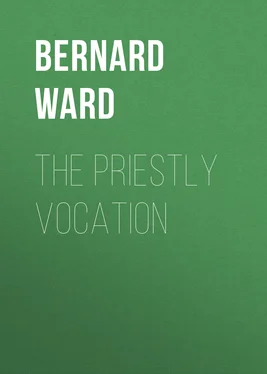Bernard Ward - The Priestly Vocation
Здесь есть возможность читать онлайн «Bernard Ward - The Priestly Vocation» — ознакомительный отрывок электронной книги совершенно бесплатно, а после прочтения отрывка купить полную версию. В некоторых случаях можно слушать аудио, скачать через торрент в формате fb2 и присутствует краткое содержание. Жанр: foreign_prose, foreign_religion, Философия, foreign_psychology, foreign_antique, на английском языке. Описание произведения, (предисловие) а так же отзывы посетителей доступны на портале библиотеки ЛибКат.
- Название:The Priestly Vocation
- Автор:
- Жанр:
- Год:неизвестен
- ISBN:нет данных
- Рейтинг книги:3 / 5. Голосов: 1
-
Избранное:Добавить в избранное
- Отзывы:
-
Ваша оценка:
- 60
- 1
- 2
- 3
- 4
- 5
The Priestly Vocation: краткое содержание, описание и аннотация
Предлагаем к чтению аннотацию, описание, краткое содержание или предисловие (зависит от того, что написал сам автор книги «The Priestly Vocation»). Если вы не нашли необходимую информацию о книге — напишите в комментариях, мы постараемся отыскать её.
The Priestly Vocation — читать онлайн ознакомительный отрывок
Ниже представлен текст книги, разбитый по страницам. Система сохранения места последней прочитанной страницы, позволяет с удобством читать онлайн бесплатно книгу «The Priestly Vocation», без необходимости каждый раз заново искать на чём Вы остановились. Поставьте закладку, и сможете в любой момент перейти на страницу, на которой закончили чтение.
Интервал:
Закладка:
Our poverty, however, is of a totally different type, and our dangers of a different nature. The life of a secular priest may be full of care and anxiety on the question of money—difficulty of making ends meet, support of church and school, perhaps the weight of a capital debt, good works languishing for want of means—the poor dependent on him—and so forth. He will wear a threadbare coat, and deny himself any food or comfort that are not absolutely necessary for the sake of his people and his work. This is a poverty more wearing and apparently less sanctifying. Poor jaded human nature longs to be free from care and anxiety, and we easily lose sight of the supernatural power of poverty. We look on it as the unfortunate accompaniment of the existing state of Catholic England; we fail to remember that it is one of the great sources of blessing on it. Hence the anxiety of some priests to be placed on better missions, with more pay and less work, a hope for better days in recognition of past services and so forth.
What is to be our remedy? How are we to learn to love our poverty, to realise its power for good, to make it, as it can be made, the greatest source of our sanctification?
The answer to all these questions is one and the same. Our life must have about it the notes and characteristics of the poor men that we are. It must be a life of humility and self-effacement, hardiness, and of work; there must be no self-indulgence; and, above all, we must surrender our liberty to the call of duty. Let us consider these points in detail.
1. A poor man does not think of himself individually; he knows that he is only one of a multitude of human beings similarly circumstanced. He has to work for his living, and is willing to put up with whatever his lot may be, provided he can earn what is necessary for the support of himself and those who depend on him. He does not resent being slighted: he looks upon it as his natural lot. Nor does he put forward his own wishes or opinions. He only desires to be able to go his way and do his daily work. Our Lord was in this, as in other things, our model. He had lived nearly thirty years at Nazareth, and all that his fellow townspeople had to say of Him was, "Is not this the carpenter?"—as though to say, "Is he not like any other carpenter?"– "How came this man by all these things?" (St. Mark vi. 2, 3.) In like manner a priest with the spirit of poverty will seek no notoriety, will not wish to be known from his fellow clergy, but will only seek to be allowed to live the daily life on the mission, and to share its blessings. He will look on the ordinary rough usage of life merely as incidents to be expected, while he pursues the end of his calling, the acquisition not of temporal, but of spiritual riches: the "unum necessarium," so far as he is concerned.
2. A poor man does not seek after self-indulgence. If money is spent on himself, he has to do additional work to earn it: this thought is a perpetual stimulus to self-denial. In similar manner, to a priest on the mission there is plenty of such stimulus. Such small sums of money as may pass through his hands are wanted over and over again for the relief of the poor around him. Their needs are ever present, and appeal loudly and forcibly to him. If he is a rector, the expenses of the mission have to be met, and they are often increased by having to find interest on mortgages or capital debt, sometimes leaving little or nothing for personal expenses or salary. Here necessity to some extent asserts itself; but not altogether. A priest in a so-called comfortable mission has the physical power to make himself very comfortable. He can furnish his rooms well, so that they appeal both to his artistic sense and to his self-indulgence: he can spend money enough to give himself the best of food, without sinning against justice or defrauding anybody; he can save money enough for a first-rate holiday once a year. His work may languish, though he does all he is bound to do, and no one can make a complaint against him.
Yet he is living a life unworthy of his state, and one which will not bring any blessing on him such as the sanctification of his flock. Where is his spirit of poverty? Has a poor man always plenty of good food? Does not his work sometimes suffer from his forced abstemiousness? Can he give himself a holiday of the nature indicated? Truly many a man of the world would envy the comfortable life of a priest who has lost the spirit of poverty. A zealous priest on the other hand will strive to live economically. His measure of food is just that which will support him and enable him to do his work efficiently: his measure of comfort 19 19 The question of how to furnish one's rooms must be always a personal one for each priest to settle. To some, the advantage of an attractive room, artistically decorated, both as to furniture and pictures, may be a help towards their work, and induce them to spend time among their books which might otherwise be frittered away. But the effeminate or even luxurious method of furnishing that one has occasionally seen is hard to defend in a priest's room. Cardinal Vaughan ends his book on The Young Priest by this advice:— "We have but one caution to offer, and that is, not to furnish your room as though it were a lady's boudoir. Indulgence in this kind of taste tells unfavourably upon a Priest's own character and stamps the man in the judgment of others" ( The Young Priest, p. 34).
will be that which he needs for his work. If he be in a well-to-do mission, he will willingly save what he can for the relief of the poor at his doors. If he is on a poorer mission, or if he is a junior priest, he will willingly accept any necessary self-denial, both as a schooling for himself and because he knows that what is saved will find a worthy destination in the hands of the poor and needy, or in the support of the Church.
3. A poor man is a hard-working man. "Exibit homo ad opus suum, et ad operationem suum usque ad vesperam." "Man shall go forth to his work, and to his labour until evening." 20 20 Ps. ciii. 23.
Such is the ordinary lot of mortals. By far the majority have to work for their daily bread. They only think themselves fortunate to have work ready to their hands which will enable them to earn what they require. Now a priest may be a hardworking man or not as he himself decides. The amount of work absolutely necessary and binding ex justitia is usually not large. His Sunday duty may be heavy; but during the greater part of the week he is free. But if he has the spirit of his state, the work ready to his hand is inexhaustible; and the salvation of numberless souls depends upon his doing it. "Why stand ye here all the day idle?" is Christ's reproach to those who have time on their hands and do not use it. St. Alphonsus made a vow that he would never pass a minute of time unoccupied. Such a vow if kept to would mean a heroic life. Far short of that we can well learn to use our time with the sense of responsibility. To throw away time in inordinate reading of the newspapers, accompanied with the smoking of cigarettes, may not be definitely sinful; but it is throwing away opportunities which will never recur. A hard-working business man once explained to the writer that he never wasted a moment of time: so much so that if he had to wait in a waiting-room before seeing some one, he would exercise himself by valuing in his mind all the objects of furniture, which he considered a good business training of the faculties. Truly the children of this world are in their way wiser than the children of light. He said Time is money: we can say, Time is eternal life. Which of the two maxims makes time more valuable, or should make us harder workers?
4. Uncertainty as to the future. We often hear a demand among the clergy for "fixity of tenure." This means that a Rector, without Canonical fault, should not be removable from his mission, which should be bound to give him support in sickness and old age. There is nothing unreasonable in this aspiration, at least for those who have a certain number of years of work behind them: the ordinary law of the Church is designed to produce such security. Nevertheless, we in England, when we were truly missioners, and had no such claim to fall back upon, were undoubtedly practising the virtue of poverty in a higher degree than those who had complete and permanent parochial livings. A poor man's future is always precarious, depending on his services being still wanted, his employers being themselves prosperous, his own health remaining strong, and a thousand other contingencies of life. A missioner in accepting a like state of precariousness is putting himself on a higher plane than that of the ordinary parochial clergy, and many priests, with the true spirit of their vocation, have rejoiced in their condition in this respect, the hardship of which has been much mitigated by the existence of clergy funds which secure to the aged and infirm an amount of help quite out of proportion with the entrance fees or subscriptions they have to pay, and thus far better than any mutual help association of the working man.
Читать дальшеИнтервал:
Закладка:
Похожие книги на «The Priestly Vocation»
Представляем Вашему вниманию похожие книги на «The Priestly Vocation» списком для выбора. Мы отобрали схожую по названию и смыслу литературу в надежде предоставить читателям больше вариантов отыскать новые, интересные, ещё непрочитанные произведения.
Обсуждение, отзывы о книге «The Priestly Vocation» и просто собственные мнения читателей. Оставьте ваши комментарии, напишите, что Вы думаете о произведении, его смысле или главных героях. Укажите что конкретно понравилось, а что нет, и почему Вы так считаете.












